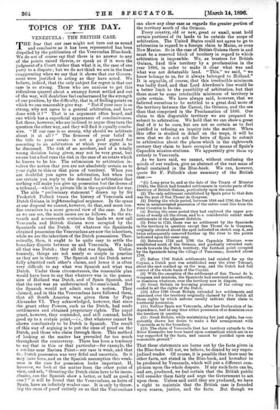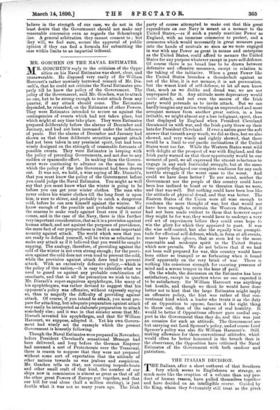TOPICS OF THE DAY.
VENEZUELA: THE BRITISH CASE. THE fear that our case might not turn out as sound and conclusive as it has been represented has been dispelled by the publication of the Venezuelan Blue-book. We do not of course say that there is no answer to any of the points raised therein, or speak as if it were the judgment of a Court rather than what it is, the case of one party to a dispute ; but we do not think we are in the least exaggerating when we say that it shows that our Govern- ment were justified in acting as they have acted. We believe, indeed, that the only subject for regret is that our case is so strong. Those who are anxious to get this ridiculous quarrel about a swampy forest settled and out of the way, will doubtless feel embarrassed by the strength of our position, by the difficulty, that is, of finding points on which we can reasonably give way. "But if your case is so strong, why not agree to a general arbitration, and have done with it ? " That is an argument often heard, and one which has a superficial appearance of conclusiveness. Let those, however, who are inclined to argue thus turn the question the other way, and they will find it equally conclu- sive. "If our case is so strong, why should we arbitrate about it at all ? " The firmness of your belief in the title to your estate is not a good ground for assenting to an arbitration at which your right is to be discussed. The risk of an accident, and of a totally wrong decision being given, may not be very great, but no one but a fool runs the risk in the case of an estate which he knows to be his. The submission to arbitration in- volves the notion that you are not absolutely certain as to your right to this or that piece of territory. When you are doubtful you agree to arbitration, but when you are certain you reply to the demand for arbitration that nothing will make you give up possession but the decree of a tribunal,—which in private life is the equivalent for war.
The able "preliminary statement" drawn up by Sir Frederick Pollock traces the history of Venezuela and Dutch Guiana in iteidironological sequence. In the space at our disposal we cannot, however, do that, and must con- fine ourselves to a more general view of the case. As far as we can see, the main issues are as follows. In the six- teenth and seventeenth centuries the lands we now call Venezuela and British Guiana were occupied by the Spaniards and the Dutch. Of whatever the Spaniards obtained possession the Venezuelans are now the inheritors, while we are the inheritors of the Dutch possessions. Theo- retically, then, it ought to be quite easy to settle the boundary dispute between us and Venezuela. We take all that was Dutch ; they all that was Spanish. Unfor- tunately, things are not nearly so simple in practice as they are in theory. The Spanish and the Dutch never fully admitted each other's claims, and hence it is often very difficult to say what was Spanish and what was Dutch. Under these circumstances, the reasonable plan would have been to say that whatever was in the posses- sion of Holland was Dutch, and of Spain Spanish, and that the rest was an undetermined No-man's-land. But the Spanish would not admit such a notion. They claimed, and in this the Venezuelans have followed them, that all South America was given them by Pope Alexander VI. They acknowledged, however, that since the grant other Powers, such as the Dutch, had made settlements and obtained proprietary rights. The papal grant, however, they contended, and still contend, holds good up to a certain point,—i.e., that whatever cannot be shown conclusively to be Dutch is Spanish. The result of this way of arguing is to put the onus of proof on the Dutch, and those who claim through them. This method of looking at the matter has prevailed far too much throughout the controversy. There has been a tendency to say that in this or that particular—for example, the c at-line near Barima Point—our case is weak, and that th..: Dutch possession was very fitful and uncertain. So it may have been, and on the Spanish assumption this weak- ness in the case for possession looks important. If, however, we look at the matter from the other point of view, and ask, "Granting the Dutch claim here to be incon- clusive, can the Spanish show a better, or half as good a one ? " it will be found that the Venezuelans, as heirs of Spain, have an infinitely weaker case. It is only by throw- ing the onus of proof entirely on us that the Venezuelans can show any clear case as regards the greater portion of the territory south of the Orinoco. Every country, old or new, great or small, must hold certain portions of its lands to be outside the scope of arbitration. The United. States could not agree to go to arbitration in regard to a foreign claim to Maine, or even New Mexico. So in the case of British Guiana there is and must be a reserved block of territory in regard to which, arbitration is impossible. We, as trustees for British, Guiana, fixed this territory by a proclamation in the year 1886, in order to make it clear what was and what was not debateable land. "This," we said, "we know belongs to us, for it always belonged to Holland." It is arguable of course, that this irreducible minimum was badly fixed, and that Lord Aberdeen's line would be a better limit to the possibility of arbitration, but that there must be some irreducible minimum of territory is quite certain. We have always said, however, that we believed ourselves to be entitled to a great deal more of the territory between the Caroni, the Orinoco, and the sea than that comprised in the Proclamation of 1886. OUT claim to this disputable territory, we are prepared to submit to arbitration. We hold that we can show a great deal of it to be ours, but are not so certain as to feel justified in refusing an inquiry into the matter. When this offer is studied in detail on the maps, it will be seen that we do not ask the heirs of Spain to submit to arbitration about the places which in the eighteenth century they claim to have occupied by means of Spain's Capuchin mission-stations. We apparently give them up entirely to Venezuela.
As we have said, we cannot, without confusing the minds of our readers, give an abstract of the vast mass of detail contained in the Blue-book. We can, however, quote Sir F. Pollock's clear summary of the British case :— " (1) Long prior to, and at the date of the Treaty of Munster (1648), the Dutch had founded settlements in various parts of the territory of British Guiana, particularly upon the coast.
(2) The only settlement established by Spain prior to that date was the post of San Thome de Guayana. (3) During the whole period, between 1648 and 1796, the Dutch were in uninterrupted possession of the entire coast line from the river Corentin to Bathes.
(4) During the same period they had explored the upper por- tions of nearly all the rivers, and to a considerable extent made settlements in the adjacent districts. (5) Prior to 1723, there was no settlement by the Spaniards in the territory in question except San Thome de la Guayana, originally situated about the spot indicated on sketch map A, and twice subsequently removed further up the river to the points indicated upon the same map. (6) Between 1724 and 1796 the Capuchin Missions were established south of the Orinoco, and gradually extended east- wards towards the Dutch territory, the furthest point occupied by the Spaniards being the village of Tameremo, founded about 1788.
(7) Before 1796 Dutch settlements had existed far up the Cuyuni, a Dutch post was established near the river Yuruari, about the spot marked up on the map, and the Dutch had full control of the whole basin of the Cuyuni.
(8) With the exception of the settlement of San Thome de In Guayana and missions, the Spaniards had exercised no authority, or dominion whatever, over the territery now in dispute.
(9) Great Britain on becoming possessor of the colony suc- ceeded to all the rights of the Dutch.
(10) After 1796 Great Britain extended her settlements and exercised over the territory originally claimed by the Dutch all those rights by which nations usually indicate their claim to territorial possession.
(11) Neither Spain nor Venezuela, after her Declaration of In- dependence, had at any time either possession of or dominion over the territory in question.
(12) Great Britain, while maintaining her just rights, has con- sistently shown her desire to make a fair arrangement with Venezuela as to the boundary.
(13) The claim of Venezuela that her territory extends to the River Essequibo has been based upon contentions which are in no way supported by the facts, and cannot be justified upon any reasonable ground."
That these statements are borne out by the facts given in the Blue-book will not, we believe, be denied by any unpre- judiced reader. Of course, it is possible that there may be other facts, not stated in the Blue-book, and hereafter to be produced by Venezuela, which will put a different com- plexion upon the whole dispute. If any such facts can be, and are, produced, we feel certain that the British public will consider them fairly and urge the Government to act upon them. Unless and until they are produced, we have a right to maintain that the British case is founded upon reason, justice, and the facts. But though we believe in the strength of our case, we do not in the least desire that the Government should not make any reasonable concession even as regards the Schomburgk line. A general arbitration they cannot consent to ; but they will, we feel sure, secure the approval of public opinion if they can find a formula for submitting the case within limits to an impartial tribunal.







































 Previous page
Previous page